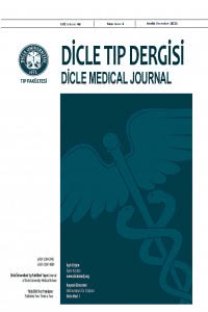The Value of International Staging System in Predicting Survival of Multiple Myeloma Patients With Renal Failure
Renal Yetmezliği Olan Multipl Myelom Hastalarında Uluslararası Evreleme Sisteminin Sağkalımı Göstermedeki Değeri
___
1. Rajkumar V. Multiple Myeloma. Curr Probl Cancer 2009; 33: 7–64.2. Kumar SK, Rajkumar SV, Dispenzieri A, et al. Improved survival in multiple myeloma and the impact of novel therapies. Blood 2008; 111: 2516– 20.
3. Kastritis E, Zervas K, Symeonidis A, et al. Improved survival of patients with multiple myeloma after the introduction of novel agents and the applicability of the International Staging System (ISS): an analysis of the Greek Myeloma Study Group (GMSG). Leukemia 2009; 23: 1152–7.
4. Greipp PR, San Miguel J, Durie BG, et al. International staging system for multiple myeloma. J Clin Oncol 2005; 23: 3412–20.
5. Knudsen LM, Hippe E, Hjorth M, Holmberg E, Westin J. Renal function in newly diagnosed multiple myeloma: A demographic study of 1353 patients. The Nordic Myeloma Study Group. Eur J Haematol 1994; 53: 207–12.
6. Knudsen LM, Hjorth M, Hippe E. Renal failure in multiple myeloma: Reversibility and impact on the prognosis. Nordic Myeloma Study Group. Eur J Haematol 2000; 65: 175–81.
7. Kyle RA, Gertz MA, Witzig TE, et al. Review of 1027 patients with newly diagnosed multiple myeloma. Mayo Clin Proc 2003; 78: 21–33.
8. Irish AB, Winearls CG, Littlewood T. Presentation and survival of patients with severe renal failure and myeloma. QJM 1997; 90: 773–80.
9. Blade J, San Miguel JF, Fontanillas M, et al. Increased conventional chemotherapy does not improve survival in multiple myeloma: long-term results of two PETHEMA trials including 914 patients. Hematol J 2001; 2: 272-8.
10. National Kidney Foundation. K/DOQI clinical practice guidelines for chronic kidney disease: evaluation, classification, and stratification. Am J Kidney Dis 2002; 39: S1–S266.
11. Durie BG, Harousseau JL, Miguel JS, et al. International uniform response criteria for multiple myeloma. Leukemia 2006; 20: 1467–73.
12. Dimopoulos M, Kastritis E, Michalis E, et al. The International Scoring System (ISS) for multiple myeloma remains a robust prognostic tool independently of patients’ renal function. Annals of Oncology 2012; 23: 722–9.
13. Pawlyn C, Cairns D, Kaiser M, et al. The relative importance of factors predicting outcome for myeloma patients at different ages: results from 3894 patients in the Myeloma XI trial. Leukemia 2020; 34: 604–12.
14. Alexanian R, Barlogie B, Dixon D. Renal failure in multiple myeloma. Pathogenesis and prognostic implications. Arch Intern Med 1990; 150: 1693–5.
15. Bethea M, Forman DT. Beta 2-microglobulin: its significance and clinical usefulness. Ann Clin Lab Sci 1990; 20: 163–8.
16. Child JA, Kushwaha MR. Serum beta 2- microglobulin in lymphoproliferative and myeloproliferative diseases. Hematol Oncol 1984; 2: 391–401.
- ISSN: 1300-2945
- Yayın Aralığı: 4
- Başlangıç: 1963
- Yayıncı: Cahfer GÜLOĞLU
Turgay SOLAK, Yavuz Sami SALİHOĞLU, Rabiye Uslu ERDEMİR
Koronavirüs Cerrahi Vakalarında Genel Anestezi Yönetimi: Farklı Bir Fikir
Hakan AKELMA, Sedat KAYA DURMUŞ
Yaşlı Hastalardaki Spinal Anestezide Median ve Paramedian Yaklaşımın Değerlendirilmesi
Ahmet ŞEN, Pınar DUMAN AYDIN, Seyhan Sümeyra AŞCI, Seyfi KARTAL, Esra KONGUR, Hasan Rıza AYDIN
Epilepside Non-Epileptik Nöbet Sıklığı, Anksiyete ve Depresyonla İlişkisi
Mesrure KÖSEOĞLU, R.Gökçen GÖZÜBATIK-ÇELİK, Dilek ATAKLI, Muazzez Gökçen KARAHAN, Mecbure NALBANTOĞLU, Ayten CEYHAN DİRİCAN
Ortopedik Enfeksiyonların Tedavisinde Sodyum Hipoklorit’in Yeri Var mıdır?
Şeyhmus YİĞİT, Mehmet Sait AKAR, Erdal ÖZBEK
Ring Chromosome 13, A Rare Case Report
Sedat ŞİMŞEK, Diclehan ORAL, İlyas YÜCEL, Selahaddin TEKEŞ, Edip ÜNAL
Ünsal SAVCI, Mustafa Fethi ŞAHİN, Barış ESER, Hüseyin KAYADİBİ
Mustafa ŞAHİN, Ünal SAVCI, Barış ESER, Hüseyin KAYADİBİ
Nodular Lymphocyte Predominant Hodgkin Lymphoma With SarcoidLike Granulomas: A Rare Association
Monika GUPTA, Nilay NISHITH, Ruchika MAJOKA, Meenu GILL, Rajeev SEN
